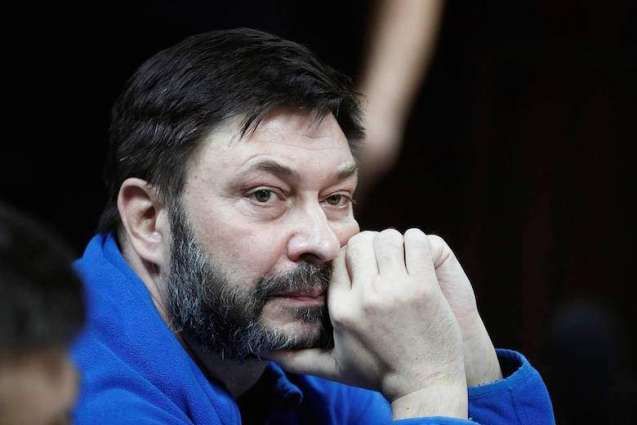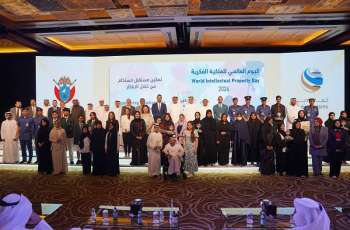Kiev's appellate court ruled on Wednesday to release RIA Novosti Ukraine portal head Kirill Vyshinsky, who has been held in a Ukrainian jail for over 400 days, on personal recognizance
MOSCOW (Pakistan Point News / Sputnik - 28th August, 2019) Kiev's appellate court ruled on Wednesday to release RIA Novosti Ukraine portal head Kirill Vyshinsky, who has been held in a Ukrainian jail for over 400 days, on personal recognizance.Vyshinsky was detained by employees of the Ukrainian Security Service (SBU) in a parking lot near his house in Kiev on May 15, 2018. Later that day, he was transferred to the southern Ukrainian city of Kherson, where he was taken into custody by a court order. In addition, the SBU conducted searches in his home, the RIA Novosti Ukraine office in Kiev and the homes of some of the media's employees.
No other journalist of RIA Novosti Ukraine portal, which is a media partner of the Rossiya Segodnya International Information Agency, were detained or charged, but they were summoned for questioning by the SBU.
On May 17, a court in Kherson ruled that Vyshinsky should be arrested and detained for 60 days without bail. He was charged with supporting the self-proclaimed Donetsk and Luhansk people's republics in the east of Ukraine and high treason. Vyshinsky's arrest was extended several times afterward.
During one of his court hearings, Vyshinsky asked for help from Russian President Vladimir Putin, adding that he would be willing give up his Ukrainian citizenship to that end he is a dual Ukrainian-Russian national. The State Migration Service of Ukraine said that the journalist could not legally have his Ukrainian citizenship renounced before the trial against him was completed.
On September 5, the Kherson court was considering whether to extend the arrest of or change the measure of restraint for Vyshinsky, but the hearing had to be adjourned because the defendant, who had suffered a heart attack a week prior, felt sick. Vyshinsky was taken straight to a prison hospital but after a short physical exam returned to court.
The court granted the defense's request for a a full-scale medical examination for their client in light of his deteriorating health. However, the results of the examination were later deemed insufficient by the defense.
The journalists' defense filed a motion with the Ukrainian Supreme Court to appeal against Vyshinsky's illegal detention. According to his lawyer, bringing the case to the Supreme Court would have allowed the defense to present the case to the European Court of Human Rights. However, Ukraine's top court dismissed the appeal on May 27, 2019, after which Vyshinsky's lawyers demanded that the matter be re-examined by the Kherson appeal court.
On January 14, the Ukrainian prosecutor's office completed its pre-trial investigation into his case, after which the journalist and his defense started to go through the 31 volumes of case files.
On February 21, the Kherson city court granted the prosecutors' petition to limit the time Vyshinsky had to review the case materials until February 28.
On March 6, it became known that Ukrainian prosecutors had sent an indictment against Vyshinsky to Kiev's Podolsky district court.
The Kiev court held a preparatory hearing on Vyshinsky's case on March 26 and refused to return the case to the prosecution. Instead it started examining the merits of the case on April 4. That same day, the prosecutors started reading out the 80-page indictment � they finished the process on June 10.
Vyshinsky was charged with committing several crimes in Ukraine, including high treason, dissemination of materials calling for a violent overthrow of the constitutional system, conspiracy to seize state power, calls to change Ukraine's state border, incitement to ethnic hatred, and acquisition and possession of firearms. The harshest sentence Vyshinsky could face under these articles is 15 years in prison.
Vyshinsky said the SBU's allegations contained "frank manipulations and absurd lies." The journalist also added that the SBU was accusing him of conducting "special information operations that would benefit Russia's interests," specifically publishing articles with an "anti-Ukrainian" bias rather than objective information. Vyshinsky noted that during his time as head of the website between 2014 and 2018, Kiev never complained about the lack of objectivity.
The journalist wrote a letter in which he explained that his arrest was unlawful because "it was based on absurd and false accusations" put forward by the SBU against him. The journalist recalled the SBU's statements about how on May 15, 2018, the day of his arrest, he organized the publication of an article titled "Attack on the UOC [Ukrainian Orthodox Church]. Who is to blame for the failure of autocephaly?" on RIA Novosti Ukraine portal.
According to the security service, the publication "was placed in the interests of Russia ... in order to provide assistance in ... countering the obtaining of autocephaly by the local Ukrainian church." However, the journalist made clear that the material in question was a news report that was prepared by editors from open sources and presented two different points of view.
In his letter, Vyshinsky cited the forensic examination of the article, which was conducted by the Ukrainian Research Institute of Special Technology and Forensic Expertise of the SBU. The experts determined that the article was not unlawful. They also said it did not contain statements "which, by their semantic understanding, are a public justification for extremist, separatist or terrorist acts" or that conveyed "signs of anti-Ukrainian propaganda of the communist, national-socialist (Nazi) totalitarian regimes."
On July 3, the district court in Kiev suspended hearings on Vyshinsky's case because two newly appointed prosecutors said they had not had enough time to familiarize themselves with the case materials. The defense as well as many experts believed that the prosecutor's office deliberately delayed the process.
The Podolsky district court resumed hearings on July 19 and ruled to extend Vyshinsky's arrest until September 19. The defense has since filed an appeal against the court's decision.
On August 28, Kiev's appellate court ruled to release Vyshinsky from detention on personal recognizance. The journalist is required to appear in court upon the first request and inform investigators about whether he had moved or changed jobs. He is also banned from communicating with witnesses. As Vyshinsky himself stated to the media, he considers the court decision to be reasonable and fair.
Putin had called Vyshinsky's arrest unprecedented, arguing that Vyshinsky was arrested while performing his professional duties.
Thomas Greminger, the secretary-general of the Organization for Security and Co-operation in Europe (OSCE), had also expressed concern about the situation, adding that all OSCE member states should comply with international standards and avoid interfering in the media's work.
Moscow had sent two notices of protest to Kiev demanding that it end its aggression against media workers.
In April 2019, more than 250 journalists in Russia and from across the world signed a petition asking Ukrainian President Volodymyr Zelenskyy to free Vyshinsky. In July, a personal letter from Vyshinsky's mother was handed over to Zelenskyy.
Vyshinsky did not agree to any prisoner exchanges and said he was determined to seek a fair trial.
Meanwhile, a criminal case has opened against Vyshinsky's lawyer, Andriy Domansky, over suspicions of illegally privatizing a nonresidential property on the territory of a conservation area in Kiev. Domansky has suggested that these charges were leveled against him because of his involvement in the Vyshinsky case. The International Commission of Jurists in Brussels has recognized the case against Domansky as political persecution.




